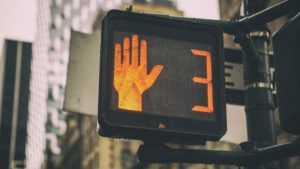“The reports come soon after the revelation that Chinese police were using face-scanning smartglasses to catch fugitives in a railway station in Zhengzhou and at a highway checkpoint near Beijing.”
Police authorities in China are using facial recognition to name and shame jaywalkers.
As South China Morning Post reports, authorities have already set up camera systems at certain intersections that will display a jaywalker’s image, name, and part of their civil ID number on a large LED screen. Now, the AI firm behind the system says it’s in talks with mobile carriers and social media platforms to set up a system that would automatically send a mobile alert to an offender’s phone when jaywalking is detected. With enough infractions, jaywalking will affect an individual’s social credit score, which has implications on things like the ability to get a loan.
It is, to employ a much-abused word, Orwellian. But it’s just a small example of how biometric surveillance technology is being embraced by China’s police state. As a new Business Insider report points out, multiple municipal and provincial governments in the country are now using facial recognition technology through a surveillance platform called Skynet, for everything from identifying fugitives to tracking where persons of interest hang out, and, yes, flagging jaywalking.
The reports come soon after the revelation that Chinese police were using face-scanning smartglasses to catch fugitives in a railway station in Zhengzhou and at a highway checkpoint near Beijing. Meanwhile, biometric surveillance is even more intrusive in the Xinjian region, where government authorities have engaged in the mass collection of biometric data from the local population, comprised of a large Uyghur muslim minority. Police all over the world are interested in the potential of biometric surveillance, but China’s police state is beginning to illustrate the extremes of the technology’s applications.
Sources: South China Morning Post, Business Insider
–
March 27, 2018 – by Alex Perala







![[Sponsors Added] Our Next Virtual Event is All About Biometrics in the Enterprise](https://idtechwire.com/wp-content/uploads/camilo-jimenez-smartphones-multiple-unsplash-150x150.jpg)
Follow Us